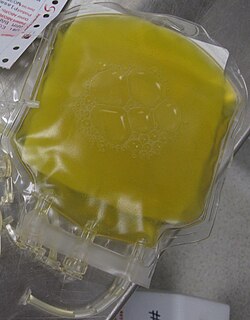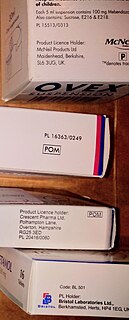Intravenous therapy (IV) is a therapy that delivers liquid substances directly into a vein. The intravenous route of administration can be used for injections or infusions. Intravenous infusions are commonly referred to as drips. The intravenous route is the fastest way to deliver medications and fluid replacement throughout the body, because the circulation carries them. Intravenous therapy may be used for fluid replacement, to correct electrolyte imbalances, to deliver medications, and for blood transfusions.

Blood plasma is a yellowish liquid component of blood that normally holds the blood cells in whole blood in suspension. In other words, it is the liquid part of the blood that carries cells and proteins throughout the body. It makes up about 55% of the body's total blood volume. It is the intravascular fluid part of extracellular fluid (all body fluid outside cells). It is mostly water (up to 95% by volume), and contains dissolved proteins (6–8%) (e.g. serum albumins, globulins, and fibrinogen), glucose, clotting factors, electrolytes (Na+, Ca2+, Mg2+, HCO3−, Cl−, etc.), hormones, carbon dioxide (plasma being the main medium for excretory product transportation) and oxygen. It plays a vital role in an intravascular osmotic effect that keeps electrolyte concentration balanced and protects the body from infection and other blood disorders.

Cardiac output, is a term used in cardiac physiology that describes the volume of blood being pumped by the heart, in particular by the left or right ventricle, per unit time. Cardiac output is the product of the heart rate (HR), or the number of heart beats per minute (bpm), and the stroke volume (SV), which is the volume of blood pumped from the ventricle per beat; thus, CO = HR × SV. Values for cardiac output are usually denoted as L/min. For a healthy person weighing 70 kg, the cardiac output at rest averages about 5 L/min; assuming a heart rate of 70 beats/min, the stroke volume would be approximately 70 mL.

A prescription drug is a pharmaceutical drug that legally requires a medical prescription to be dispensed. In contrast, over-the-counter drugs can be obtained without a prescription. The reason for this difference in substance control is the potential scope of misuse, from drug abuse to practicing medicine without a license and without sufficient education. Different jurisdictions have different definitions of what constitutes a prescription drug.
An NHS foundation trust is a semi-autonomous organisational unit within the National Health Service in England. They have a degree of independence from the Department of Health. As of February 2016 there were 152 NHS Foundation Trusts.
The Cambridge University Hospitals NHS Foundation Trust is one of the United Kingdom's NHS foundation trusts. It was originally named Addenbrooke's NHS Trust. It became a foundation trust and was renamed in 2004.
A vascular bypass is a surgical procedure performed to redirect blood flow from one area to another by reconnecting blood vessels. Often, this is done to bypass around a diseased artery, from an area of normal blood flow to another relatively normal area. It is commonly performed due to inadequate blood flow (ischemia) caused by atherosclerosis, as a part of organ transplantation, or for vascular access in hemodialysis. In general, someone's own vein (autograft) is the preferred graft material for a vascular bypass, but other types of grafts such as polytetrafluoroethylene (Teflon), polyethylene terephthalate (Dacron), or a different person's vein (allograft) are also commonly used. Arteries can also serve as vascular grafts. A surgeon sews the graft to the source and target vessels by hand using surgical suture, creating a surgical anastomosis.
Basildon and Thurrock University Hospitals NHS Foundation Trust provides healthcare for people in the south west Essex, in the East of England. There are two hospitals in the trust, a specialist cardiothoracic centre and one clinical centre: Basildon University Hospital, Orsett Hospital, The Essex Cardiothoracic Centre and Billericay St. Andrew's Centre. It became a Foundation Trust in 2004.
The NHS Business Services Authority (NHSBSA) is an executive non-departmental public body of the Department of Health which provides some support services to the National Health Service in England and Wales. It was created on 1 October 2005 following a review by the Department of Health of its "arm's length bodies". It began operating on 1 April 2006, bringing together five previously separate NHS business support organisations. It provides a range of services to NHS organisations, NHS contractors and patients which include:

A medical laboratory or clinical laboratory is a laboratory where clinical pathology tests are carried out on clinical specimens to obtain information about the health of a patient to aid in diagnosis, treatment, and prevention of disease. Clinical Medical laboratories are an example of applied science, as opposed to research laboratories that focus on basic science, such as found in some academic institutions.
Unwarranted variation in health care service delivery refers to medical practice pattern variation that cannot be explained by illness, medical need, or the dictates of evidence-based medicine. It is one of the causes of low value care often ignored by health systems.

The National Health Service (NHS) is the publicly funded national healthcare system for England and one of the four National Health Services for each constituent country of the United Kingdom. It is the largest single-payer healthcare system in the world. Primarily funded through the government funding and overseen by the Department of Health and Social Care, NHS England provides healthcare to all legal English residents, with most services free at the point of use. Some services, such as emergency treatment and treatment of infectious diseases, are free for everyone, including visitors.

The NHS in England, NHS Scotland, NHS Wales, and the affiliated Health and Social Care (HSC) in Northern Ireland were established together in 1948 as one of the major social reforms following the Second World War. The founding principles were that services should be comprehensive, universal and free at the point of delivery. Each service provides a comprehensive range of health services, free at the point of use for people ordinarily resident in the United Kingdom, apart from dental treatment and optical care.

Royal Free London NHS Foundation Trust is an NHS foundation trust based in London, United Kingdom. It comprises Royal Free Hospital, Barnet Hospital, Chase Farm Hospital, as well as clinics run by the trust at Edgware Community Hospital, Finchley Memorial Hospital and North Middlesex University Hospital. On 1 July 2014 the Barnet and Chase Farm Hospitals NHS Trust was acquired by Royal Free London NHS Foundation Trust, making it one of the largest Trusts in the country, employing more than 9,000 staff and providing services to about a million patients.

Bupa is an international healthcare group, with its origins and headquarters in the United Kingdom but now serving 32 million customers in 190 countries. It is a private healthcare not for-profit company limited by guarantee, unlike the UK's National Health Service (NHS), which is a tax-funded healthcare system.
Care UK is a British company providing health and social care. The company works with councils, Clinical Commissioning Groups and doctors to deliver care and support for older people and those with learning disabilities or mental health problems, as well as a range of healthcare services for NHS patients.

A medical tricorder is a handheld portable scanning device to be used by consumers to self-diagnose medical conditions within seconds and take basic vital measurements. While the device is not yet on the mass market, there are numerous reports of other scientists and inventors also working to create such a device as well as improve it. A common view is that it will be a general-purpose tool similar in functionality to a Swiss Army Knife to take health measurements such as blood pressure and temperature, and blood flow in a noninvasive way. It would diagnose a person's state of health after analyzing the data, either as a standalone device or as a connection to medical databases via an Internet connection.
Medworxx is a health information technology company founded in 2004 and currently based in Toronto that supplies services to over 400 hospitals in Canada, France, the United States and the United Kingdom. It was bought by Aptean in October 2015.
Sir David Morgan Sloman is the NHS Regional Director for London.
Sir Duncan Kirkbride Nichol is a British hospital administrator who was the Chief Executive of the National Health Service Management Executive from 1989 to 1994.










